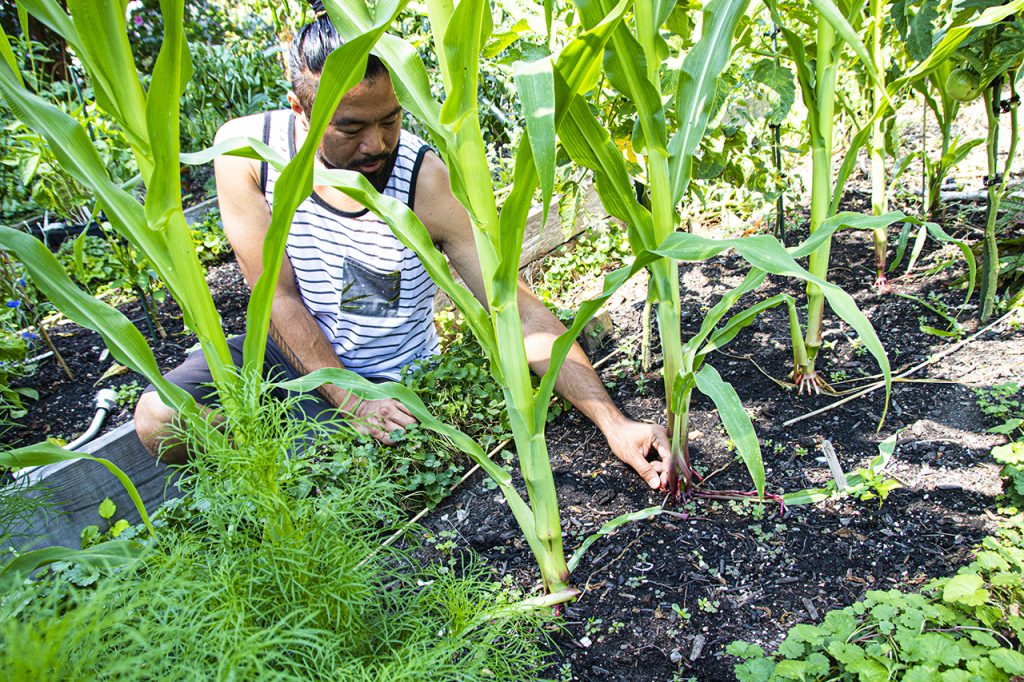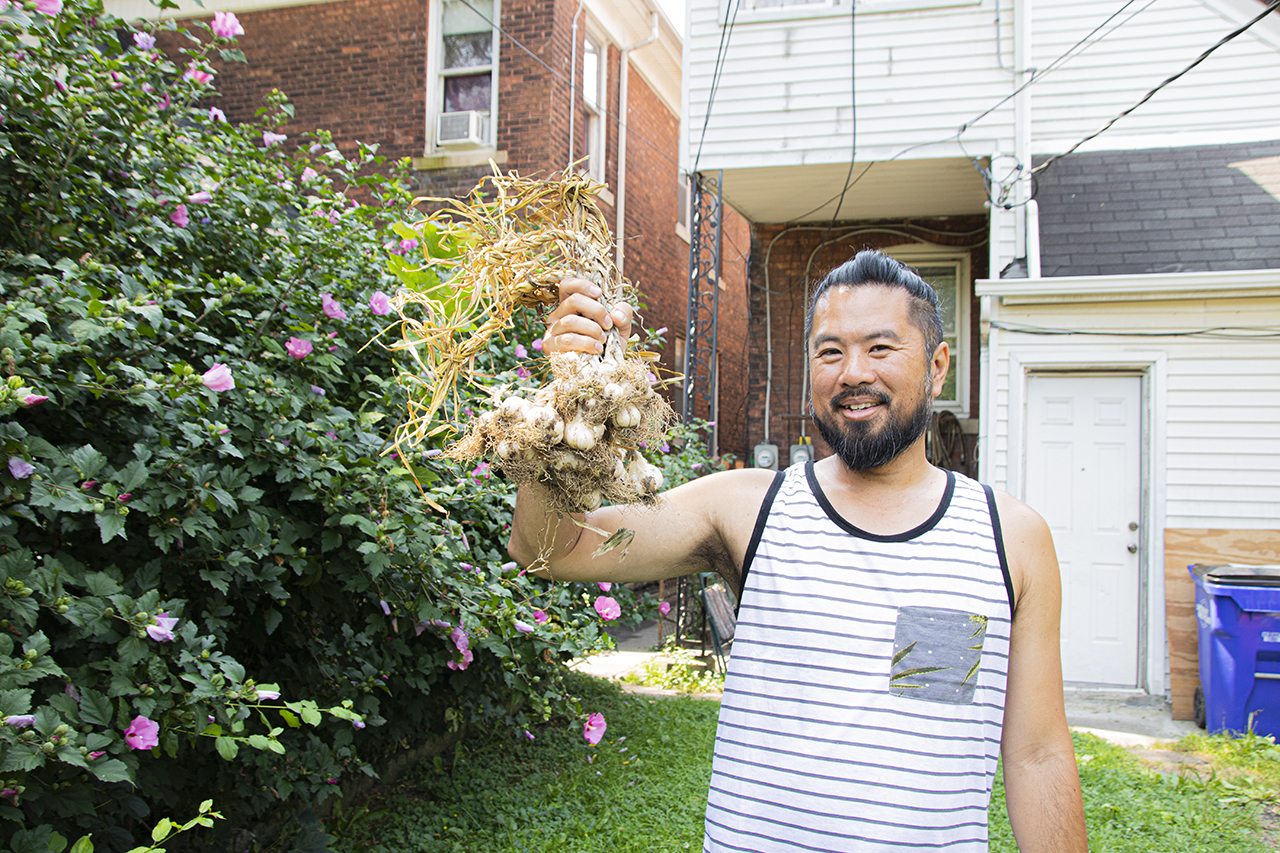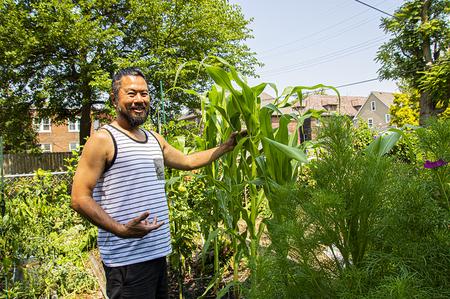Detroit Community and Cultural Organizer Uses Food as a Medium for Ancestral Healing
Lifelong Detroiter shane bernardo explores land-based practices around growing and preparing Philippine cuisine to heal intergenerational trauma and reconnect with his roots.

Rooted shares stories about land tending, community healing and regeneration happening right here on the ancestral land of the Indigenous Anishinaabe, the area commonly referred to as Detroit.

shane bernardo is a first-generation immigrant in the Philippine diaspora, a lifelong Detroit resident and a community and cultural organizer who uses food as a medium for ancestral healing.
One way in which he cultivates community through food is by hosting cooking classes celebrating dishes that define his culture.
“It’s … really exciting to be able to show folks what you can make that are exemplary of foods that we grew up, eating and preparing and celebrating as folks growing up in the [Philippine] diaspora,” says bernardo.
According to bernardo, Philippine cuisine is based on seasonal and regional varieties of food that have been influenced by a variety of cultures through trade and colonization.
“The national dish in the Philippines is adobo,” explains bernardo. “But … we were under Spanish colonial rule for 375 years, in which they had enacted the Galleon Trade between Spain, Acapulco and the Philippines. And during those centuries … we also traded with people from East Asia. So the national dish that most people know is described as a meat stew with soy sauce and vinegar. And soy sauce was introduced to us by folks from East Asia — that’s not something that’s Indigenous to my people.”
The influence of trade and colonization resulted in regional recipes that have the same name, but use vastly different ingredients, something that manifests in bernardo’s own garden.
“I may not necessarily be able to grow everything that I could possibly want, because this is a totally different climate,” says bernardo. “And so I have to adapt and sometimes replace or substitute things that I would otherwise use if I was back home in the Philippines.”
Listen: shane bernardo describes how food can heal and cultivate community.
Food as Healing

For bernardo, subsistence farming provides both a cultural tie and the food resources necessary to escape the industrial food system.
“The foods that are grown, the ingredients that I provide for the community and for my family and for myself, comes from being in relationship with the land. That is … the most important thing,” says bernardo. “When we operate within a more transactional system, like the industrial food system, where foods are reduced to a commodity, we lose that relationship. And essentially, that disconnection is what is killing us.”
bernardo’s own father passed away from chronic health issues, including heart disease, obesity and diabetes.
“He was more reliant on a Western diet, which was drastically different than what he had been accustomed to subsisting on back home, where we live closer to the soil, closer to the land,” says bernardo. “And so, it’s not just about the foods that we eat. It’s not just about our personal choice, but it’s about how we maintain that connection in the diaspora.”
Now, bernardo grows an abundance of food in his garden, a space that serves as a place of refuge for him. “My garden is an altar of sorts to be in and commune with my ancestors and my family and my community.”
“It’s’s not just about the foods that we eat. It’s not just about our personal choice, but it’s about how we maintain that connection in the diaspora.” –shane bernardo
Overcoming Generational Trauma
bernardo’s father passed away the same year his family lost their home to the subprime mortgage crisis.
“At the time, when I was dealing with the grief of losing my father, I was also dealing with the grief of losing my childhood home,” explains bernardo. “For me that put in such a vivid connection between our connection with land and our physical health.”
bernardo attributes this land-health disconnect to his father’s own health challenges, saying, “I was able to trace this connection back to our ancestral connection to land and how that affected him as a person living in the diaspora.”
According to bernardo, this is a form of generational trauma: “We are … attempting to subsist on the land that we didn’t have an ancestral connection to,” he says. “And that’s the generational trauma that I’m attempting to address with the work that I do around food as healing.”
Building Community Through Food
For bernardo, food is both a means of physical healing and community building, a concept he saw modeled in his family’s west-side grocery story, which they operated for 13 years when his father couldn’t find a job in his field.
“We opened up a store catering to other folks in the Philippine diaspora, who had emigrated abroad,” says bernardo. “There [weren’t] very many places where you could source some of the foods that our family and folks in our culture were accustomed to eating, preparing and celebrating.”
Though it catered to customers of the Philippine diaspora, it served West African and Caribbean communities. “I started to see other folks in our store other than people from the Philippine diaspora,” says bernardo. “And that also shined a light on how our foods were influenced by other people through colonization and trade.”
For bernardo, food became a connector. “The foods that we shared became mediums for communicating with one another, for sharing recipes for sharing stories, and figuring out how we navigate an environment where we don’t necessarily feel like we belong,” he says.

Today, food creates community for bernardo in other ways, many of which can be seen in his garden. His largest plant, Cherokee Eagle corn, was gifted to him by fellow grower Kirsten Kirby Shoote. “It’s not just about growing food that I want to eat,” says bernardo. “It’s about being in a relationship with the soil. And also that could not have happened unless Kirsten and I were friends.”
He also grows things like peppers, scallions, leeks, garlic and more to barter with Meiko Krishok of Guerrilla Food. “It’s been a really beautiful way to be able to live out my values around co-creation and collaboration with Meiko and other other folks in the community,” he says.
Though his garden is a source of community connection, it’s also a source of personal motivation. “What keeps me going is this garden — when I come back here, you really have to focus on what’s going on here,” he says. “Something magical that happens when I tap into my creative spirit and connect to nature and the elements and the land that allows me to re-center myself reground myself, and fill myself up with what I need.”
Trusted, accurate, up-to-date.
WDET strives to make our journalism accessible to everyone. As a public media institution, we maintain our journalistic integrity through independent support from readers like you. If you value WDET as your source of news, music and conversation, please make a gift today.
